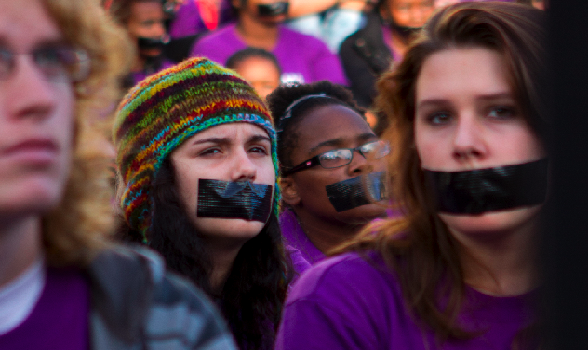R*pe: Still a Four-Letter Word
Main Article Content
Abstract
F*ck. Sh*t. D*mn.
Most of us learned at an early age what the “forbidden” four-letter words were. We knew not to use them, especially around those with authority, and to be shocked and disgusted when we heard someone else use them.
R*pe. Rape. Who knew that rape would still be a forbidden word in 2014? Feminism is finally cool again, women are outperforming men in educational settings, and what falls within the parameters of an “acceptable” romantic relationship has generally increased since the 1950s.
So why do the most recent reports from the Bureau of Justice paint a picture that sounds painfully familiar in an otherwise progressive era:
- Between 2006 and 2010, an estimated average of 211,200 rape and sexual assault cases went unreported each year.
- In that five-year period, 55% of male victims of violent crime did not file a report with the police. 49% of female victims did not file either.
- 20% of females, compared with 8% of males, claimed they chose not to file a report for fear of reprisal OR getting the offender in trouble.
Why all the silence? Gender stereotyping cannot be the only cause, since research has shown that men are capable of becoming rape victims and women are capable of being the attackers. Popular culture cannot be the only cause, since a plethora of crime shows, such as Law & Order and Crime Scene Investigation, have featured victims of all ages, ethnicities, and genders becoming victims who seek police action that results in the attacker being caught and held accountable.
It seems that fear of perception may be the answer. If Bioethics is truly a field dedicated to the principles of justice, non-maleficence, autonomy, and beneficence, then rape, both its perception and prevalence, needs to become a topic of conversation.
- How can we institute and enforce policies saying that abortion in the case of rape is acceptable, if we still have not agreed upon what rape is and is not?
- How can patients who have been raped or sexually assaulted be treated, both physically and psychologically, if people feel unable to speak up?
- If a potential victim does seek medical attention, how much care should there be and what kinds should be given? Should a more paternalistic standard of care be given to college students, such as in the recently breaking Florida State University case, who may feel unsure of what to do? Should intimate partner violence assaults have a different standard of care from unknown attacker cases?
- What steps can/should medical professionals take to ensure that victims are educated enough to recognize that they have been raped or sexually assaulted? Should they limit their care to physical issues, or extend their care to include extensive psychiatric and police follow-up?
Further aggravating some of the more prevalent issues surrounding rape cases are the mixed messages that the internet allows quick access to. Just as campuses nationwide are taking steps to prevent and spread awareness about forms of sexual assault, articles entitled “White House Faking Rape Statistics” are being circulated and viewed. As non-profit organizations such as RAINN (Rape, Abuse, & Incest National Network) are helping victims define what happened to them and do something about it, articles such as “The Victims of False Rape Accusations” quote scholarly research that shows a 2%-8% rate of false rape reports, despite college students believing 50% of rape allegations are false.
No one wins when a rape claim falls suspect due to petty factors such as stereotypes and other preconceived notions. Everyone loses when stories circulate about rape claims truly being falsified, regardless of the reasons. We all suffer when the stigma of rape silences beneficial conversation.
It’s 2014. Let’s talk about rape.


